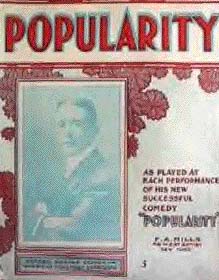Popularity
Théâtre (1906) - Flop

"Popularity" fut le premier vrai échec de Cohan. "Popularity" a été produit par Cohan et Harris au Wallack’s Theatre et créé le 1er octobre 1906 pour 24 représentations.
C’était un mélodrame mettant en vedette Thomas W. Ross dans un rôle d’idole de matinées. Le héros a été pris dans une tentative de chantage, parce qu’une héritière "nouvelle riche", qui était tombée amoureuse de lui, doit déjouer le complot d'intrigants tentant de la séduire et obtenir son argent via un mariage.
Le mauvais casting de Thomas Ross pour le rôle principal est un des facteurs majeurs de l'échec…
1 Popularity peut-être considéré comme un Flop musical
Aucun dossier informatif complémentaire concernant Popularity
Aucun dossier informatif complémentaire concernant Popularity

Version 1
Popularity (1906-10-Wallack's Theatre-Broadway)
Type de série: OriginalThéâtre: Wallack's Theatre (Broadway - Etats-Unis) Durée : Nombre : 24 représentationsPremière Preview : 01 October 1906
Première: 01 October 1906
Dernière: InconnuMise en scène : George M. Cohan • Chorégraphie : Producteur : George M. Cohan • Sam H. Harris • Star(s) : Avec: Tim Cronin, Frederic De Belleville, Lores Grimm, John Jack, Frank Kelly, William Keough, Roy La Rue, Adelaide Manola, Marcus Moriarty, Edythe Moyer, Sachiro Oida, Florence Rockwell, R. Rogers, Harriet Ross, Thomas W. Ross, Edgar Selwyn, Howard StevensPresse : "The thanks of every lover of the drama are due to Mr. George M. Cohan. This experienced playwright and subtle satirist, forsaking for the time being the profitable but unintellectual field of musical comedy, has produced a work which is worthy of himself. When it is stated that not even George Bernard Shaw has ever dared write anything approaching Mr. Cohan's 'Popularity' in incisive irony and stinging sarcasm some idea of the remarkable character of the comedy . . . can be obtained. Mr. Cohan's plan was a simple one. As all great artistic tours de force are simple. He decided to write a play which should be a burlesque of everything unutterably bad, trite, and wooden in the present day drama--a play which should have a plot beneath contempt, dialogue of a kind which would make even audiences in Arkansas and Nevada tired, and characters which should be as unlike anything humanity ever provides as possible. He succeeded wonderfully, and the remarkable nature
of his irony, the courageousness of his innovation, will be apparent when it is stated that never once in the play did he take the audience into his confidence
Some of them even went away with the idea that they had been witnessing a shocking bad play, and one or two were heard to remark that Cohan had better stick to his music. Such is the stupidity of the average playgoer.
If the play had been what the Philistines in the audience thought it, instead of a finished and delicate piece of irony, it would have to be said that the cast was altogether too good for it. There was not a bad actor or actress in the production." (New York Times - 2 octobre 1906)
Pas encore de video disponible pour ce spectacle